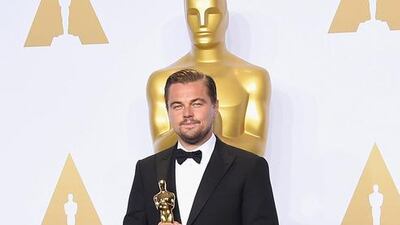Associated Press
In an underdog win for a movie about an underdog profession, newspaper drama Spotlight took Best Picture at an Academy Awards riven by protest and outrage, and electrified by an unflinching performance from host Chris Rock.
Tom McCarthy's film about the real-life story of the Boston Globe's investigation into sexual abuse by Catholic priests defeated heavily-tipped frontier epic The Revenant. His well-crafted drama, with a strong ensemble cast, had lagged at other awards in the run-up to the Oscars, behind Alejandro Iñárritu's wilderness epic.
But Spotlight – an ode to the hard-nose, methodical work of pioneering journalism that is increasingly rare in a cost-cutting industry – took the top award of the night, despite winning only one other Oscar, for McCarthy and Josh Singer's original screenplay. The last time this happened was 1952's The Greatest Show On Earth.
“We would not be here today without the heroic efforts of our reporters,” said producer Blye Pagon Faust. “Not only do they effect global change, but they absolutely show us the necessity for investigative journalism.”
Streaks, broken and extended, dominated much of the evening. After going home empty-handed four times previously in the acting category, Leonardo DiCaprio finally won his first Oscar, lifting Best Actor for his brutal, tortured performance in The Revenant. He was greeted with a standing ovation, and used his big moment to talk about climate change.
“Let us not take our planet for granted,” he said. “I do not take tonight for granted.”
His director, Iñárritu, won the award for Best Director, making it back-to-back wins after the success last year of Birdman. It was a feat matched by only two other filmmakers: John Ford and Joseph L Mankiewicz.
The Revenant also won Best Cinematography, for Emmanuel Lubezki, the first cinematographer to win three times in a row (after wins for Gravity and Birdman), and only the seventh three-peat in Oscar history.
Inarritu, whose win meant three straight years of Mexican filmmakers winning Best Director (Alfonso Cuarón won in 2014 for Gravity), was one of the few winners to talk passionately about diversity in his acceptance speech.
“What a great opportunity for our generation to really liberate ourselves from all prejudice and this tribal thinking and to make sure for once and forever that the colour of our skin becomes as irrelevant as the length of our hair,” said Inarritu.
While it missed out on the big awards, the film that won the most on the night was George Miller's post-apocalyptic Mad Max: Fury Road. It picked up six awards in technical categories for editing, make-up, production design, sound editing, sound mixing and costume design.
The Best Actress award went to Brie Larson, the 26-year-old breakout star of the mother-son captive drama Room. Swedish star Alicia Vikander took Best Supporting Actress for her role in transgender drama The Danish Girl.
In another big surprise, the award for best supporting actor went to renowned British stage actor Mark Rylance, for his scene-stealing performance alongside Tom Hanks in Bridge of Spies. His victory over Sylvester Stallone drew gasps of surprise. Stallone, nominated a second time for the role of boxer Rocky Balboa in the film Creed, 39 years after the first, had been expected by many to win his first acting Oscar.
Adam McKay and Charles Randolph took the best adapted screenplay award for their self-described “trauma-dy” about the American mortgage meltdown of 2008, which triggered the global financial crisis. McKay thanked Paramount Pictures for taking a risk on a movie about “financial esoterica”.
Better known for broad comedies including Anchorman and Step Brothers, McKay gave a US election-year warning about the power of "big money" and "weirdo billionaires" in the presidential campaign.
The election was otherwise largely absent the ceremony, but US vice president Joe Biden received a standing ovation before talking about sexual assault on college campuses. He also introduced best-song nominee Lady Gaga.
Composer John Williams wascelebrating his 50th Oscar nomination for Star Wars: Episode VII – The Force Awakens, but lost out to veteran Ennio Morricone, who, at 87, landed his first competitive Oscar for Quentin Tarantino's The Hateful Eight. Best known for his memorable scores to westerns, including The Good The Bad and the Ugly, A Fistful of Dollars and Once Upon a Time in the West, he received an honorary Oscar in 2009.
Sam Smith and songwriting partner Jimmy Napes picked up the award for Best Song for Writing's on the Wall, from the James Bond film Spectre.
The Best Animated Feature award went to Inside Out, Pixar's eighth win since the category was created in 2001.
Asif Kapadia's Amy, about British singer Amy Winehouse, took Best Documentary, while Hungary lifted its second best foreign language Oscar for Laszlo Nemes' Son of Saul, a harrowing drama set within a concentration camp.
Down the road from the Dolby Theatre, Reverend Al Sharpton led a protest by several dozen demonstrators against a second straight year of all-white acting nominees.
“This will be the last night of an all-white Oscars,” Sharpton vowed at the rally.
* Associated Press

